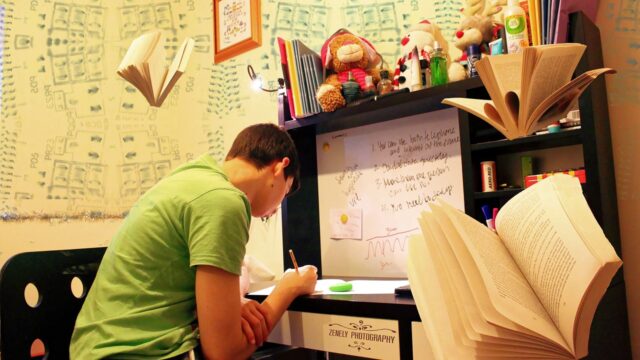ライフハックとしてではなく、英語学習にも極めて有用なのが、著名人が10分程度のプレゼンを行うTEDです。
TED Talksとは、あらゆる分野のエキスパートたちによるプレゼンテーションを無料で視聴できる動画配信サービスのことです。10年ほど前にサービスが開始されてから、政治、心理学、経済、日常生活などの幅広いコンテンツが視聴できることから人気を集めています。
RareJob English Lab
TEDは4000を超える膨大な数の動画があります。しかし慣れないうちは、動画の探し方や視聴のコツが分かりませんよね。この記事では、数多くのTEDを見てきた管理人(塩@saltandshio)が、心を揺さぶられたトークをあらすじと一緒にご紹介します。
ウェンディ・デ・ラ・ローザ:貯金するための3つの心理的なコツ
私たちは皆貯金をしたいと思っていますが、現在、貯金をする人は減っています。行動科学者のウェンディ・デ・ラ・ローザは、金銭的な幸福度を高めるために、人々が日々どのように決断を下すかを研究しています。彼女の研究結果から、もっと貯金を増やして出費を減らそうと決意するのを楽にしてくれるヒントが見つかるかもしれません(約5分半)。
[PR]無料体験レッスン実施中!全国208校、創業40年の老舗英会話スクール【シェーン英会話】貯金が出来ないのと意志が弱いのは無関係
ウェンディ・デ・ラ・ローザは、「貯金にまつわる行動には、賢さも意志の強さも関係しません」と言います。それではなぜ、年々貯金をする人が減っているのでしょうか。それは、環境が大きく左右するからです。
ある研究で2つにグループ分けをして、Aグループには月あたりの収入を提示して、Bグループには週あたりの収入を提示しました。その結果、週あたりで収入を把握したBチームのほうがうまくやりくりが出来ました。
ここで大事なのは、収入額そのものは変わっておらず、収入を把握する条件を変えただけだということです。
Now, it’s important to know that we didn’t change how much money people were receiving, we just changed the environment in which they understood their income.
この結果から、環境要因には大きな影響力があることがわかります。つまり、環境要因を変えることで貯金が出来るようになるということです。
[PR]まずは無料カウンセリング”続けるため”の オンライン英語コーチ「スピークバディ パーソナルコーチング」(1)将来の自分に約束したことを守ろう
私たちは先のことを考える時、「いまの自分」と「将来の自分」が同じ場所にいます。ほとんどの場合、私たちは将来の自分を完璧な人として考えています。さらに、自分と同一人物であることを忘れています。そしてそれについては、ターリ・シャーロットもTED Talksで話していましたね。

私たちは、未来の自分を高く見積もっています。ある研究機関の調査で、確定申告前と確定申告後の2回に分けて、自分がいくら貯金できるかアンケートをとったところ、確定申告前は27%貯金できると答えたのに対して、確定申告後は17%まで下がっていました。なんと、将来と今の自分の間に、10%の差が生まれていたのです。
しかし、少なくとも自分は27%貯金できると考えられたのです。その力を利用しましょうとウェンディ・デ・ラ・ローザは言います。
ちょっと考えて、今の自分にはちょっと難しいことを、将来の自分に約束できることを考えてみましょう。
So take a moment and think about the ways in which you can sign up your future self for something that you know today will be a little bit hard.
前もって貯金額を決めるアプリなどを使い、決めた額を貯金するようにしてみましょうと、ウェンディ・デ・ラ・ローザはアドバイスします。ポイントは約束を守ることです。
[PR]しちだの魔法ペンなら35日でバイリンガルに!楽天4部門1位の英会話!<七田式>(2)変化の時を味方につけよう
心理学で「フレッシュスタート効果」と呼ばれる効果があります。なにか特別な日から始めると習慣が続くといわれるものです。
今すぐ、次の誕生日の前日に予定を書き込みましょう。金銭関連で一番やりたいことを考えるんです。
それをやり遂げましょう
So right now, put a meeting request on your calendar for the day before your next birthday. Identify the one financial thing you most want to do.
And commit yourself to it.
続けることが大きな力になることについては、アイヴァン・ジョーゼフも話しています。出来ない理由を考えるより、出来る事をしていくことがまず大切なことですね。

(3)ちょっとした日々の支出を管理しよう
多くの人が、銀行の手数料の次に後悔する出費が外食費です。
外食費は、ほぼ毎日する出費で、じわじわ効いてくるものです……。
It’s a frequent purchase we make almost every day, and it’s death by a thousand cuts.
一杯のコーヒー、一箱のタバコ、ちょっとしたお菓子や、一本だけと買ったアルコール飲料。これらを一年間積み上げてみると、その金額にビックリする人も多いでしょう。
私たちは、自分を高く見積もっているだけではなく、自分に甘いところもあります。なので、カードの限度額を設定してそれ以上は追加して支払うなどの、目に見える形で管理することによって、余計な出費が抑えられるようになるでしょう。
[PR]検定試験合格者累計140万人!スマホ対応☆国家資格ほか資格取得ならSMART合格対策講座まとめ:将来の自分のために今できることをしよう
そうはいっても、突然のトラブルや、急なイベントで出費を強いられることがあります。収入から、支出や貯金を計算してもその通りにならないこともあります。
でも幸い、自覚していますし、ある環境でどう振る舞うかを予測することもできます!
But luckily, we know this about ourselves, and we can predict how we’ll act under certain environments.
その予測する力を、貯金することに活用してみましょう。その行動を始める時が、まさに「いま」なのです。コツコツと続けていくことで、気が付けば私たちの将来は大きく変わっていることでしょう。
英語全文
We all know that saving is important and is something that we should be doing. And yet, overall, we’re doing less and less of it.
<全文を読む>▼クリック▼
Your savings behavior isn’t a question of how smart you are or how much willpower you have. The amount we save depends on the environmental cues around us. Let me give you an example.
We ran a study in which, in one group, we showed people their income on a monthly basis. In another group, we showed people their income on a weekly basis. And what we found was that people who saw their income on a weekly basis were able to budget better throughout the month. Now, it’s important to know that we didn’t change how much money people were receiving, we just changed the environment in which they understood their income. And environmental cues like this have an impact.
So I’m not going to share tricks with you that you already know. I’m not going to tell you how to open up a savings account or how to start saving for your retirement. What I am going to share with you is how to bridge this gap from your intentions to save and your actions. Are you ready?
Here’s number one: harness the power of pre-commitment. Fundamentally, we think about ourselves in two different ways: our present self and our future self. In the future, we’re perfect. In the future, we’re going to save for retirement, we’re going to lose weight, we’re going to call our parents more. But we oftentimes forget that our future self is exactly the same person as our present self. We know that one of the best times to save is when you get your tax return.
So we tried an A/B test. In the first group, we texted people in early February, hopefully before they even filed for their taxes. And we asked them, “If you get a tax refund, what percentage would you like to save?” Now this is a really hard question. They didn’t know if they would receive a tax refund or how much. But we asked the question anyway. In the second group, we asked people right after they received their refund, “What percentage would you like to save?”
Now, here’s what happened. In that second condition, when people just received their tax refund, they wanted to save about 17 percent of their tax refund. But in the condition when we asked people before they even filed their taxes, savings rates increased from 17 percent to 27 percent when we asked in February. Why? Because you’re committing for your future self, and of course your future self can save 27 percent. These large changes in savings behavior came from the fact that we changed the decision-making environment. We want you to be able to harness that same power. So take a moment and think about the ways in which you can sign up your future self for something that you know today will be a little bit hard. Sign up for an app that lets you make savings decisions in advance. The trick is, you have to have that binding contract.
Number two: use transition moments to your advantage. We did an experiment with a website that helps older adults share their housing. We ran two ads on social media, targeted to the same population of 64-year-olds. In one group, we said, “Hey, you’re getting older. Are you ready for retirement? House sharing can help.” In the second group, we got a little bit more specific and said, “You’re 64 turning 65. Are you ready for retirement? House sharing can help.” What we’re doing in that second group is highlighting that a transition is happening.
All of a sudden, we saw click-through rates, and ultimately sign-up rates, increase when we highlight that. In psychology, we call this the “fresh start effect.” Whether it’s the start of a new year or even a new season, your motivation to act increases. So right now, put a meeting request on your calendar for the day before your next birthday. Identify the one financial thing you most want to do. And commit yourself to it.
The third and final trick: get a handle on small, frequent purchases. We’ve run a few different studies and found that the number one purchase people say they regret, after bank fees, is eating out. It’s a frequent purchase we make almost every day, and it’s death by a thousand cuts. A coffee here, a burrito there … It adds up and decreases our ability to save.
Back when I lived in New York City, I looked at my expenses and saw that I spent over 2,000 dollars on ride-sharing apps. It was more than my New York City rent. I vowed to make a change. And the next month, I spent 2,000 dollars again — no change, because the information alone didn’t change my behavior. I didn’t change my environment.
So now that I was 4,000 dollars in the hole, I did two things. The first is that I unlinked my credit card from my car-sharing apps. Instead, I linked a debit card that only had 300 dollars a month. If I needed more, I had to go through the whole process of adding a new card, and we know that every click, every barrier, changes our behavior.
We aren’t machines. We don’t carry around an abacus every day, adding up what we’re spending, in comparison to what we wanted. But what our brains are very good at is counting up the number of times we’ve done something. So I gave myself a limit. I can only use ride-sharing apps three times a week. It forced me to ration my travels. I got a handle on my car-sharing expenses to the benefit of my husband, because of the environmental changes that I did. So get a handle on whatever that purchase is for you, and change your environment to make it harder to do so.
Those are my tips for you. But I want you to remember one thing. As human beings, we can be irrational when it comes to saving and spending and budgeting. But luckily, we know this about ourselves, and we can predict how we’ll act under certain environments. Let’s do that with saving. Let’s change our environment to help our future selves.
<閉じる>


\ ほかにも気になるトークが満載! /








